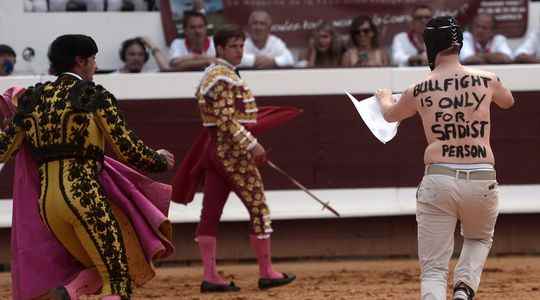The National Assembly is due to examine this Thursday a parliamentary proposal ending the exemption enjoyed by bullfighting from the ban on animal abuse, for “uninterrupted local tradition”. Not putting all its eggs in one basket, the France Insoumise group gave up targeting cockfighting, practiced in the North and overseas, and placed the proposal in last position in its “parliamentary niche”, which which makes its examination uncertain.
The denunciation of bullfighting is as old as bullfighting itself. Where its supporters celebrate an art, that of tamed death and sublimated violence, its adversaries see it as a barbaric wedding in which man debases himself, arousing his sadism and that of the crowd by inflicting atrocious suffering on a innocent animal. Long hit by theological prohibition and kept on the edge by authorities worried about popular excesses, bullfighting games have gained cultural and economic status by professionalizing and codifying bullfighting, without ever extinguishing the violent polemical passions it has always aroused. . Between aficionados and opponents, understanding is impossible: these are two discourses which exclude each other in principle.
However, this opposition may now change in nature to become the matrix of a multiplication of irreducible conflicts around the relationship between man and animal, from hunting to ritual slaughter and the reintroduction of large predators. , through the production and consumption of meat. These conflicts are not only ethical: they also bring into play hostile representations of the “other camp” on the social and cultural level, even psychologically.
Humanize the animal or de-animalize the human
How can all this end? Whichever way you take it, the cause of bullfighting seems ineluctably compromised: it is not only that its adversaries present irrefutable arguments as to the suffering of animals, long denied or minimized; they also have strength in numbers, with a clear majority of French people – and Spaniards – approving the ban. Opposite, the supporters of a practice which finds fewer and fewer followers, including in bullfighting towns, seem to be waging a rearguard fight with dubious overtones: after all, if it is enough to invoke the tradition, was not afraid to affirm the deputy Caron, why not justify excision?
Here we are faced with the comparison which provokes unease, and which makes us grasp a stake more decisive than bullfighting: by raising the torture of the bull to the level of that of the sexually mutilated child, it is the horror of excision that we demean and relativize. However, it is not certain that by humanizing the animal we manage to de-animalize the human, or conversely to return it to an innocent nature.
I do not insist on how candid such an anthropological bet can be. I also see some paradox in the fact of protesting in favor of bulls while applauding the reintroduction by the hand of man of the bear and the wolf, whose victims number in the thousands in the herds. Our urban and digitalized societies are all the more concerned about animal well-being as they seem to accommodate the rise of physical violence between humans, but also of moral intolerance: the idea is spreading there that my well-being depends not only on my freedom, but also on the limitation of that of others, not because it reduces or threatens mine, but because it causes me a moral suffering which I consider intolerable.
Thus, the disappearance of bullfighting, by democratic decision or lack of fighters, is certainly very likely in line with history. Ditto for most hunting practices, which are increasingly contested. We can be sorry, or not. On the other hand, without even invoking the anthropological dimension that emerges in our relationship to the death inflicted on animals, there is perhaps reason to worry, more than about the fate of bullfighting, about the future of a a society where causing displeasure to others and repressing what is dear to him can be considered as the progress of civilization.
